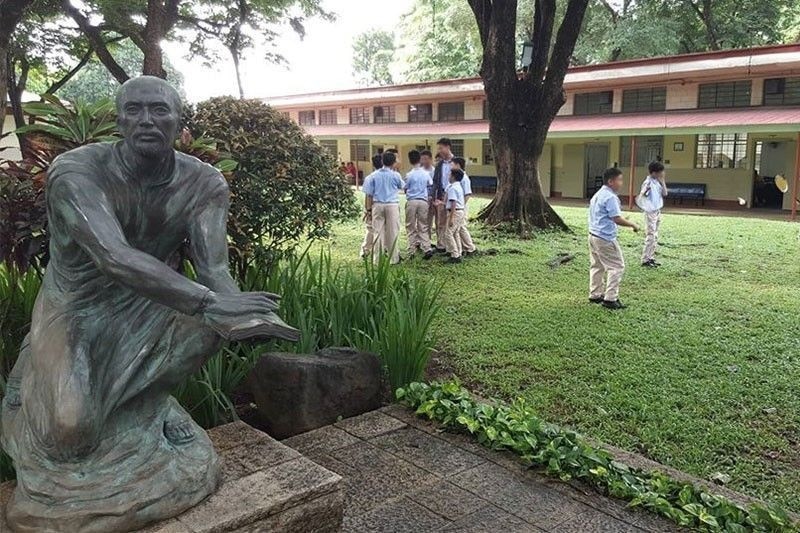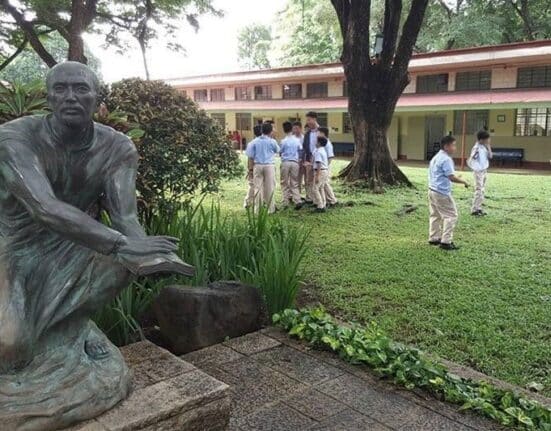AFTER 160 years of only allowing boys into its basic education schools, the Ateneo de Manila University has finally decided to fully transition to a co-educational scheme by 2030.
According to the memorandum from the ADMU, the university wants to create a more diverse space for students by allowing female students into the basic education schools.
Andrei Narciso, 4th Year School of Science and Engineering Representative, said the decision was also made in line with the school’s Lux In Domino goals. These aim to improve education and bridge cultural divides within the institution.
The implementation of this project will start in 2024. Admission for female students will start for Kinder, Grade 1, and Grade 7 levels.
This decision was born from six months’ worth of rigorous planning, studying, and consultations. The ADMU also said it directed the Vice President for Basic Education to craft the communication plan, facilities and infrastructure requirements, and the academic, formation and capability development aspects of the co-ed scheme.
Amid all the changes, some people– both in and out of the university–are wondering whether or not this is the right move.
We love to see it!
The majority of the responses from both Ateneans and non-Ateneans has been extremely positive so far. They feel that the inclusion of women in ADMU’s basic education schools is a long overdue decision.
“I’m all for it,” said Ryan Rivera, a former student of ADMU’s SHS program.
Rivera said there may be a tendency for students in all boys’ schools to form regressive beliefs.
“Historically, all-boys societies have had a tendency to promote regressive beliefs like machismo, misogyny, homophobia, and transphobia. Graduates of these all-boys schools who embrace the mentioned regressive beliefs are prone to treating people of varying [sexual orientation, gender identity, gender expression and sex characteristics] as others, not belonging,” he said.
Putting students in a co-ed environment from the earliest stages of education can allow the school to produce children and young adults who are gender-inclusive and gender-sensitive, promoting safe spaces for all, he added.
Jhio Camama, who has been attending ADMU since junior high, also supports the ADMU decision.
Like Rivera, he said all-boys schools often perpetuate an environment of toxic masculinity and locker room talk, which they may carry with them even as they grow older.
“A good chunk of these students right now will grow up to be bosses in their chosen fields. Cultivating them with gender awareness brings a lot to the table. These students may become game changers to policies and allies in the fight for equality.” Camama said.
Not all sunshine and rainbows
Despite the positive feedback from many, there are still some people who are skeptical about the implementation of this new curriculum. Others feel that ADMU may not be the best environment to bring girls into, given how long it has been limited to caring for just boys.
One student, Jamielyn Contreras, said that she appreciates the initiative, but still has reservations about it.
“I hope ngayon palang, tinuturuan or ini-include na nila sa curriculum [yung] about gender equality, and ine-emphasize yun. Based from mga experiences ng friends ko from the LGBTQIA+ community, hindi naman gaano sila comfortable, especially [since] may cases ng gender-based bullying,” Contreras said.
Narciso said ADMU has good intentions in wanting to go co-ed.
“Diversity should always be welcome, especially in such a formative age. But it should be done well, as there have been track records of institutions failing to keep the vulnerable safe,” he added.
What ADMU can do to help
Camama said the curriculum should be changed at the very start in order to teach students important concepts such as treating girls as their equal.
“Back when I was in high school, students only get to learn about feminism when they’re in Grade 10,” he said.
Many students also say that for the change to go smoothly, it’s important to plan and study every move carefully.
Rivera said facilities in the school should be adjusted to accommodate an upsurge of female students.
“Since the school was constructed decades ago with an all-boys environment in mind, facilities such as restrooms may not be enough. For example, if I remember correctly, the girls’ restroom in the covered courts is much smaller than the boys’. The university has to screen all of the Basic Ed buildings and conduct renovations where necessary to address this problem,” he said.
The administration will also need to look closely at any possible cases of bullying from the male population towards the new female students, given that they may not know how to act, he said.
He was concerned that this may translate to gender insensitivity, or even sexual harassment.
“School authorities have to firmly oppose gender-based discrimination. Anti-bullying and anti-sexual harassment policies have to be revisited and contextualized for a younger population,” he said.
Andre Dy, who has also been in ADMU since junior high, believes that during these times, it’s important to remember the school’s core values.
“Teachers and counselors should track the progress of the students more and see how they are adjusting to the new school environment. Parents should also be involved in their child’s schooling. Inviting them to school functions other than parent-teacher conferences will allow them to be included in the developing culture and know how to help their kids at home,” he said.
You’re in good hands, ladies!
Though there are still some reservations about the shift in the school’s curriculum, many feel that this decision will change Ateneo for the better.
“In the long run, when a sizeable amount of the traditionalist, macho roots of the student body have been uprooted, the university will have been rid of the obsolete male-exclusive, heteronormative, cisnormative culture, irrelevant to the modern world, that still persists today,” Rivera said.
In support of those who may become a part of ADMU’s schools after the curriculum change, Narciso reminds incoming freshies that they won’t be alone: “May kasangga ka lagi. Laging may mga ate’t kuya na handang makipaglaban kasama ka.”









